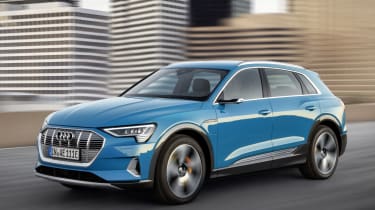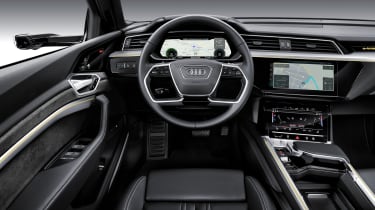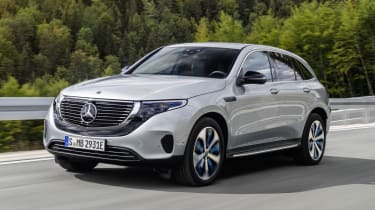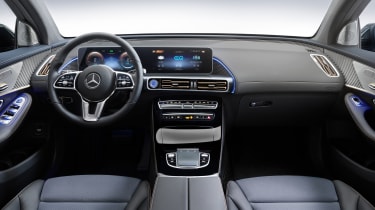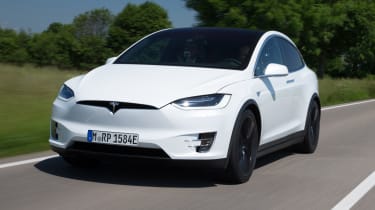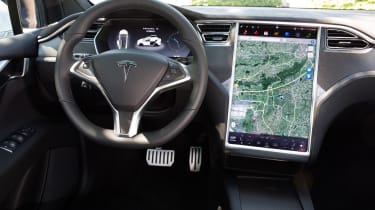Audi e-tron vs Mercedes EQC vs Tesla Model X vs Jaguar I-Pace: Premium electric SUVs compared
Four premium brands now offer electric SUVs. Here's all you need to know:
It's not only Tesla that makes an electric SUV. Audi, Mercedes and Jaguar are all embroiled in the fight for a share of the electric-car market. The Tesla Model X has been joined by the Jaguar I-Pace, Audi e-tron and Mercedes EQC, but what does each one have to offer?
This year's car registration figures confirm that SUVs are selling like hotcakes. Premium brands, too, remain sought-after and, while premium SUVs don't quite make it into the top 10 for the sheer quantity sold every year, it's no secret that buyer demand is high. Electric cars, too, are rising in popularity, so it's no surprise that a brace of well known prestigious brands are using premium SUVs to debut their electric technology.
The best electric cars you can buy today
Here's the lowdown on the Audi e-tron, Mercedes EQC, Tesla Model X and Jaguar I-Pace electric SUVs, together with a handy comparison table to help you choose the best for you.
Audi e-tron
Expected on sale in 2019, the e-tron is Audi's first ever all-electric car. The e-tron name might be familiar from electrified versions of the Audi A3 and Audi Q7, and the e-tron seems closely related to Audi's SUV line-up on the outside, but it's actually entirely new from the ground up. It follows the brand's clean-lined formula inside, too, with hi-tech display screens arranged in an orderly and attractive fashion.
With seats for five, the e-tron is about half-way between the Audi Q5 and Q7 in terms of size. It's a little bigger than the Mercedes EQC outlined below, and therefore arguably more of an alternative than a direct rival. Its greater size means it'll likely be a little more expensive, too, but we expect it to undercut the Tesla Model X.
The e-tron is claimed to manage 250 miles on a full charge, as measured using the same WLTP economy evaluation process as regular petrol and diesel cars. When range runs out, Audi claims that a 30-minute charge from a 150kW fast charger is enough to restore capacity to 80%.
As the first model to use Volkswagen Group's MEB platform, the e-tron uses separate electric motors for the front and rear axles, and Audi calls the resultant four-wheel-drive system 'e-quattro'. Total power is 356bhp, but there's a boost mode that offers 402bhp for up to 10 seconds. Acceleration from 0-62mph is claimed to take less than six seconds, with a top speed of 124mph, so the e-tron should handle motorways with ease.
Mercedes EQC
The name Mercedes EQC rather gives the brand's electric SUV plans away. 'EQ' is the identity by which all Mercedes' future electric cars will be known, and 'C' means that it aligns with the Mercedes C-Class saloon and Mercedes GLC SUV. Don't expect it to match those two on price, though – we expect it to cost around the £60,000 mark.
While the Audi wears an evolution of its brand's familiar corporate look, Mercedes has been a little more brave in establishing a visual identity for its first electric SUV. The big, slatted grille with its centrally mounted three-pointed star comes as no surprise, but it's surrounded by a bold-looking clear panel that absorbs the EQC's LED headlamps.
The look is less radical inside, where the cabin is dominated by the latest iteration of Mercedes' MBUX infotainment system, which combines two 12.3-inch screens side-by-side, expanding from the centre console to incorporate the driver's instrument panel. There are unique EQC details elsewhere, though, including metallic trim that's intended to evoke the cooling fins on hi-fi valve amplifiers.
Like the Audi, there are separate electric motors for each axle, but the Mercedes packs 402bhp without recourse to a 'boost' function. A 5.1-second 0-62mph time is claimed, along with a maximum speed of 112mph.
Mercedes also trumps Audi for battery range, with a claimed 279 miles measured under the WLTP method. When range begins to run low, a 110kW charger can take the battery pack from 10% capacity to 80% full, with fast home charging possible through an optional wallbox.
Tesla Model X
By the standards of these electric SUVs from Audi, Mercedes and Jaguar, the Tesla Model X is now getting on in years. However, the fact that it's still the benchmark every rival has to beat is testament to how far ahead of the curve the Model X was when it arrived in 2015.
The first all-electric SUV to hit the market, the Model X still looks futuristic, with a real concept-car appearance. This extends to its rear gullwing doors which open out and up like those of Doc Brown's DeLorean in Back To The Future. Many find this feature captivating, but some find them frustrating when trying to access the rear seats in tight parking spaces.
The Model X is little less pioneering inside. Its dashboard is dominated by a huge portrait-oriented central touchscreen display that controls virtually every feature and setting that the car can muster. It's surprisingly easy to use, too, with bright, appealing graphics and no end to the adjustments possible. It's fair to say, though, that Tesla can't quite match Audi or Mercedes for interior fit and finish.
It has the measure of both for electrical range and acceleration, though. Two models are available: the 75, with a claimed range of 251 miles; and the 100, which Tesla boasts can manage 351 miles on a full battery. The company also says that its huge (and growing) network of Supercharger power points can take the Model X to 80% charge after a 30-minute connection. A 0-62mph time of 4.9 seconds puts the Model X 75 ahead of the Audi and Mercedes, while the range-topping Model X 100D's startling 3.1-second 0-62mph potential is enough to challenge the most super of supercars.
Price, though, is where the Tesla's rivals fight back: the Model X has a fairly steep starting price at around £70,000, with the range-topping 100D starting at £90,130.
Jaguar I-Pace
The motoring world is still reeling from the shock of Jaguar unveiling the I-Pace: Not only is it the first zero-emissions car to come from the famous British marque, but the Indian-owned company was roundly applauded for launching a car that could challenge – or even beat – Tesla at its own game.
While it wears the traditional Jaguar front grille and headlamps that give it the same aggressive squint as the Jaguar XE and Jaguar XF saloons, the rest of the I-Pace is something of a departure from the brand. Indeed, although categorised as an SUV, it's not as bulky as the Jaguar F-Pace – its coupe-like roofline and short rear overhang give it a completely unique silhouette.
It's deceptively spacious inside, too – although the windows are narrow and the roofline curvaceous, the I-Pace has high shoulders that lift the roof to provide loads of rear-seat headroom. There's a cavernous 656-litre boot, too. Up front, the Jaguar's dashboard is a little less otherworldly than that of the Tesla, but uses Jaguar Land Rover's latest visual displays set in a sporty, driver-focused dashboard.
The I-Pace doesn't disappoint to drive, either. As with the Audi and Mercedes, there's an electric motor for each axle. Total power is 396bhp – enough for 0-62mph to pass in 4.8 seconds. If you can resist accelerating like that too frequently, you might realise Jaguar's claimed range of 298 miles, and the brand says that a forthcoming 100kW charging network will take 40 minutes to bring the battery from empty to a 240-mile range. Until then, the regular 50kW chargers most common today will take 85 minutes to provide the same range.
The I-Pace starts at £58,995 (once the UK government's plug-in grant is taken into account), and we suspect that the Mercedes EQC will be priced to compete directly when it arrives in 2019. The Audi e-tron is expected to cost a little more.
| Audi e-tron | Mercedes EQC | Tesla Model X | Jaguar I-Pace |
| 0-62mph "under 6.0" seconds | 0-62mph 5.1 seconds | 0-62mph 4.9 seconds | 0-62mph 4.8 seconds |
| 250-mile range | 279-mile range | 251 to 351-mile range | 298-mile range |
| Approx £70,000 | Approx £60,000 | From £74,650 | From £58,995 |
Recommended

New Subaru Trailseeker revealed as rugged electric SUV with 375bhp

New Subaru Solterra brings more range, power and polish
Most Popular
Tips & advice

Car dashboard warning lights: what does each symbol mean?

Electric car charging stations: public networks, charger types, apps and maps



